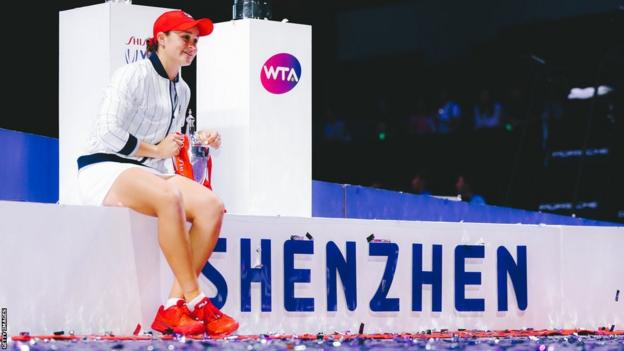The Women’s Tennis Association will resume tournaments in China this year having accepted an investigation into the sexual assault allegations made by former player Peng Shuai will not be carried out by the Chinese government.
Former doubles world number one Peng said in November 2021 she was “forced” into a sexual relationship with former China vice-premier Zhang Gaoli.
The WTA suspended its end-of-year events in China and said it would not return until there was an investigation and it had proof of Peng’s safety.
After making the accusation in a social media post, Peng briefly disappeared from the public eye and she then later denied making the allegation. Zhang has not commented publicly on the allegation.
The WTA had called for the Chinese authorities to hold a “full, fair and transparent” investigation before any tournaments could go ahead.
“We’ve been in this for 16 months and we are convinced that at this point our requests will not be met,” WTA chief executive Steve Simon told BBC Sport.
“To continue with the same strategy doesn’t make sense and a different approach is needed. Hopefully, by returning, more progress can be made.”
The decision means the final two months of the WTA season will once again be dominated by China. Simon said the schedule will be “very similar” to the pre-pandemic year of 2019 when eight Chinese tournaments were staged in eight weeks from early September.
And crucially, the season-ending WTA Finals will resume its 10-year deal with the city of Shenzhen. Prize money this year, as it was in the first year of the contract in 2019, will be £11.2m.
Simon says the “great majority” of players are in support of a return to China.
And despite promising a hard-line stance with the Chinese government, in which there would be no room for compromise, he says he has not considered resigning.
“No, I would never do that to an organisation. It’s about leading an organisation and listening to its members,” he said.
“We have athletes that come from over 80 nations, so there’s plenty of different opinions, but the majority of athletes were very supportive of a return back to the region. We certainly have some that were not, but the majority – the great majority – were in support and are in support of going back. There was strong support across the members, the [player] council and the board.”
Simon says this change of heart was not forced upon them by commercial…
Click Here to Read the Full Original Article at BBC Sport – Tennis…

